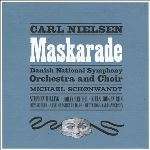|
Back
10/14/2015
Carl Nielsen: Maskarade, FS 39
Steven Milling (Jeronimus), Johan Reuter (Henrik), Niels Jørgen Riis (Leander), Stig Fogh Andersen (Leonard), Dénise Beck (Leonora), Anne Margrethe Dahl (Magdelone), Ditte Højgaard Andersen (Pernille), Christian Damsgaard (Arv), Steffan Bruun (A Watchman), Simon Duus (A Tutor), Kristian Boland (A Mask-Seller), Guido Paevatalu (Master of the Masquerades/Corporal Mors), Johan Uhrskov-Bendixsen (A Flower Boy), Asger Lynge Petersen (A Doorman), Daniel Åberg (An Officer), Adam Riis, Palle Skovlund, Rasmus Gravers Knive, Lars Pedersen, Poul Emborg (Five Students), Adam Riis (A Student), Emil Lykke (A very young student), Anna Carina Sundstedt, Iben Silberg, Rikke Lender (Young Girls), DR SymfoniOrkestret & DR KoncertKoret, Michael Schønwandt (Conductor)
Recording: DR Koncerthuset, Copenhagen, Denmark (August 12-25, 2014) – 134’56
Dacapo # 6 220641-42 (a 2 SACD-Box) – Booklet in English and Danish

   
When reading Michael Schønwandt’s foreword, one instantaneously senses an overwhelming enthusiasm and affection towards fellow countryman Carl Nielsen and the beloved Danish opera, Maskarade. Carl Nielsen’s operatic career, though brief and early in life (he stopped writing operas at age 41), took a divergent turn by subsequently channeling all musical energies primarily into symphonic works. Dacapo has three good reasons for celebration: a commemorative 150th anniversary issue, the first recording of the comic opera in the 21st century and a superb cast from top to bottom.
Maskarade, a lasting cornerstone within Danish culture, presents itself with literary groundings from Ludvig Holberg’s 1724 work, Mascarade, that Nielsen concocted (through libretto assistance by Vilhelm Andersen) with saucy, whimsical and bubbly substance. Lightly akin to Mozart’s Le nozze di Figaro, Maskarade, nonetheless, breathes a Nielsen genius in this uniquely one-of-a kind work. In 1889 Nielsen’s proficiency on strings was advanced enough for him to garner a position inside the second violins with the Royal Danish Orchestra during which time he played at the premiere of Otello and Falstaff. The latter work must have made a significant impression on Nielsen since Maskarade seethes with a sense of late-Verdi chatter and a roughened recitativo accompagnato envelope.
Nielsen’s orchestral foundation is crucial for the entire work to properly gel. The Danish National Symphony’s Orchestra’s motto, “The best and only the best” is the most fitting description of the company’s ambitions. The word “disappointing” isn’t in their vocabulary. Schwønwandt’s “Overture” reading is extremely presto and witty, helping to set the stage for the opera’s forward momentum. Never does this orchestra lose focus or fall into complacency.
Though Act I drags a bit in places, the male continent is finely represented. We’re introduced to Stephen Milling’s broadly bombastic buffoon-like character, Jeronimus. Maskarade cannot excel without a strong presence of this clod. Deeply couched inside a comfortable baritone tessitura, Johan Reuter’s Henrik, impressively shields his boss, Leander, and facilitates his disguised romance. Anne Margrethe Dahl (Jeronimus’ husband) shows her more daring side while dialoguing as Magdelone in humorous fashion with dustings of effectual naughtiness while entertaining entrees by Stig Fogh Andersen as Leonard.
A polite quietude opens Act II during Nielsen’s “Prelude” that segues into Steffen Bruun’s stabilizing Watchman voice, who, in turn, interfaces with a rather frightful Arv. Definitively deemed as comic, however, Maskarade certainly picks up a Corentin ‘fear factor’ found inside Meyerbeer’s Dinorah. Christian Damsgaard’s portrayal of Arv has a decisive mark as the trepid outside ‘guardian filter.’
In tandem to the orchestra’s artistry, The Danish National Concert Choir is nothing short of spectacular. Whether singing together en toto or hearing apportionments of an assorted type, the outcome is pleasantly executed. Particularly, the young girls’ ensemble sings in beautiful unison, and the cadre of male students are resolutely matched to the Nielsen notes. All in all, this youthful presentation has brilliant Danish dynamics, diction and delivery.
Several subplots are woven into a score that’s riddled with polite innuendos of inevitable blissful matchings: Henrik sets his sights on Pernille which Ditte Højgaard Andersen well demonstrates with her flirtations towards Henrik in silky resolve. Meanwhile, paralleling the central amorous core we find Leander and Leonora. The soprano reaches of Dénise Beck (Leonora) fill the air with a grounded lyrical legato: her romantic duet, “Ulignelige Pige”, vis-a-vis Niels Jørgen Riis, blends well and possesses sweet containment.
Where Nielsen’s vibrant colouring truly comes to life is in Act III. The narrative bracket and masquerade setting can be credited to Guido Paevatalu’s Master of the Masquerades who also wears a distinctly different ‘hat’ in the short-lived role as Corporal Mors. This brief, dubious character turnabout has shades of an impressive Grand Inquisitor, while set against the orchestra’s pizzicati to fittingly dovetail with the Andersen libretto. Paevatalu ushers in several musical interludes, including the sparky “Dance of the Cockerels” and a descriptive divertissement. Nielsen’s music pulsates with wide effervescence and Nordic poignancy. Even Johan Uhrskov-Bedixsen holds true by shyly singing his trouser role in the soprano register as The Flower Boy.
While John Frandsen’s 1977 Dansk Musik Antologi (reissued in 2005 under the Dacapo label) recording is a personal favorite, filled with more overambitious characterizations, one can’t beat the overall amenities and musical detailing this recording has to offer. Highly recommended.
Christie Grimstad
|